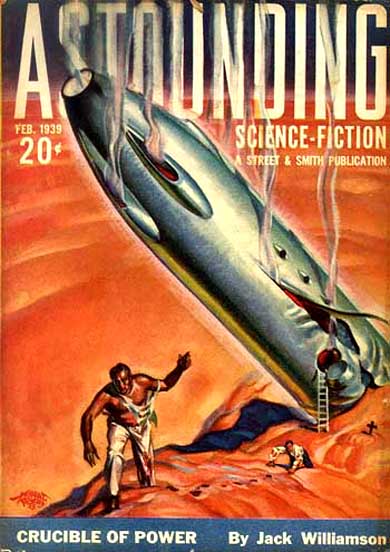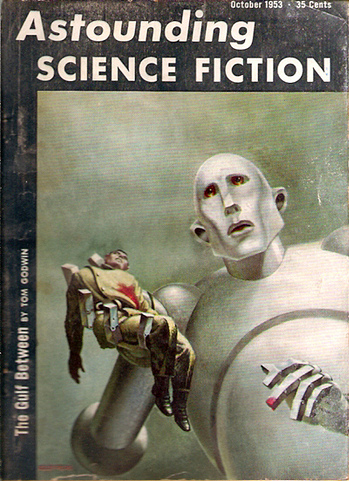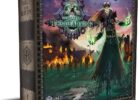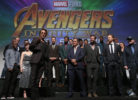Science fiction is great, a genre associated with lasers and spaceships by the general populace but which historically has done a remarkable job of exploring big questions about who we are, why we’re here, and what we can accomplish as a species. The “science” part of the equation can be pesky, though. As our scientific understanding of the universe advances, stories that once seemed rooted in a potential reality — say, the existence of intelligent life elsewhere in our solar system — can now seem dated, quaint, or downright silly.
So with that in mind, this blog post poses an interesting question: Are ‘Golden Age’ stories too dated and is it worth it to recommend Heinlein, Asimov, etc. to the new SF reader?
 The answer is an unequivocal yes. Here’s why.
The answer is an unequivocal yes. Here’s why.
Dated science or not, what ultimately matters is if the works of Golden Age masters like Arthur C. Clarke, Isaac Asimov, Jack Vance, Robert Heinlein and others are great stories that still pose important questions, explore the human condition, and still have something noteworthy to say. Or hell, even merely that they still entertain, which is a more important quality in art than we sometimes acknowledge.
Science fiction is often about (and among ardent fans is arguably best known for), duh, the science. For imagining what the future will look like, exploring the ramifications of technology and discovery, and so on. Entire book series have been based around taking theoretical technology and exploring what would happen if it was reality.
But science fiction is about more than that. The science can be outright bad and yet the work can still be essential reading. Look at legendary genre writers like Philip K. Dick, Ray Bradbury (though he denied being a SF author, and I agree), Kurt Vonnegut (who certainly had a foot firmly planted in the genre), and Ursula le Guin. Hard to find four better writers.
And their hard science was largely awful. Dick’s musings on identity and perception had as firm a grip on science as he did on reality. Bradbury wrote about spacecraft but insisted he wrote fantasy (and he did). And so on.
Didn’t matter. Their stories moved. They compelled. They entertained. They informed. They explored. They fascinated.
And this is why their work will endure.
 The works of Asimov, Clarke, Heinlein and others may have had a stronger basis in science than the four authors mentioned above, but even they were focused on exploring ideas and answering questions rather than playing with fictional technology. When Clarke explores leaps in human evolution (2001: A Space Odyssey) or the varied ways in which human societies can evolve, and ultimately clash (Songs of a Distant Earth), he’s venturing into territory more important than the science that is his bread and butter. Asimov’s robot stories may have been about robots, but they were about more than that. They were logic puzzles turned into fiction, and beyond that, explorations of just how complicated the human mind can be.
The works of Asimov, Clarke, Heinlein and others may have had a stronger basis in science than the four authors mentioned above, but even they were focused on exploring ideas and answering questions rather than playing with fictional technology. When Clarke explores leaps in human evolution (2001: A Space Odyssey) or the varied ways in which human societies can evolve, and ultimately clash (Songs of a Distant Earth), he’s venturing into territory more important than the science that is his bread and butter. Asimov’s robot stories may have been about robots, but they were about more than that. They were logic puzzles turned into fiction, and beyond that, explorations of just how complicated the human mind can be.
Sure, not all of the early SF has held up over the years. Much of it is outright bad, especially those stories that were really only ever (bad) science lessons in disguise, a popular approach during the pulp era. Yet even then there are things to learn from them. Some works of the so-called “Golden Age” may endure as lessons about what came before. Lessons about the roots of the genre that anyone aspiring to write in the genre should at least experience. Others will endure as escapist entertainment and pulpy good times. And still others — many, many others — will be deservedly forgotten and/or scorned by readers of the future.
In other words, Golden Age writers will be as essential for readers of the future as they were decades ago … provided their work was strong. And for the best of the best, it was and remains exactly that. Strong. Worth reading.
Always.
If you enjoyed this blog post, check out Geek Wisdom: The Sacred Teachings of Nerd Culture, a book I was proud to be a part of writing.







Why do I get the feeling that Western Canon took a flying swan dive into the Pulps when ivory tower academics became self-aware "they were to create (instead of critique) the next chapter in their self-defined canon"? Yet the pulps have also seemed to chuck the Anxiety of Influence to begin anew and now we're not much past the Odyssey-stage?
Do you know of any attempts to create a canon of the Pulps?
Pingback: Should I do a Star Trek movie marathon? Yes. Yes, I should … – ERIC SAN JUAN
Pingback: Robots Are Creating A Healthcare Nerdvana – ERIC SAN JUAN